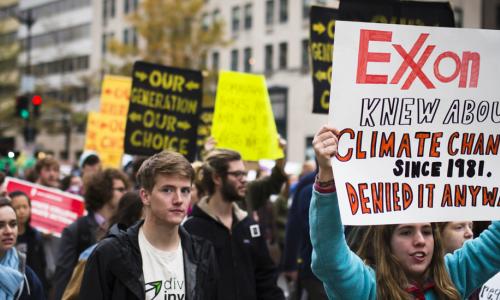Eboni Cochran is a wife and homeschool mom of an 11-year old son who lives in the Chickasaw Neighborhood of Louisville, KY. She has 3 young adult bonus children and 4 grandchildren. She is Co-Director of REACT (Rubbertown Emergency ACTion), a grassroots organization of residents living near or at the fence lines of a cluster of 11 chemical plants commonly referred to as Rubbertown. REACT works for strong laws to stop toxic air pollution from chemical plants; the protection of residents in the event of a leak, fire or explosion in a chemical plant or railcar; and full disclosure and easy access to information concerning the impact of Rubbertown facilities on residents living nearby.
How did you first learn about the chemical facilities in your neighborhood and realize that you were being exposed?
I first learned about Rubbertown chemical facilities after receiving multiple fliers at my door. After the third flier, I decided to attend a meeting and was extremely surprised at what I learned.
What kinds of health impacts did you and others in your community experience related to Rubbertown pollution?
The health impacts residents attribute to Rubbertown’s 11 chemical facilities designated as major sources of air pollutants range in severity from symptoms similar to allergies to cancer.
When people in your community started asking polluting companies about the health impacts of these chemicals, were they honest about the risks? Did they do enough to protect you and your neighbors?
When residents asked the companies AND the regulatory agency about the health impacts, neither provided the full scope of the problem.
For instance, I was once in a meeting where American Synthetic Rubber Company (ASRC) said they had reduced the amount of 1,3 butadiene by 99.7%. I mulled over that while the representative continued speaking, trying to figure out why I was sitting in the room if their emissions had decreased so dramatically. Well, I raised my hand and asked what the other .3% represented and they let me know that they were still emitting 100,000 pounds of the chemical. Then I remembered what my father always told me... “You have to know what question to ask.”
So no, I think they provide an incomplete analysis of health impacts, and they deflect by telling us we are ill because of the way we eat.
How have you helped to hold chemical facilities in your community accountable for being honest about the safety of their products?
The ways in which we have helped to hold Rubbertown chemical facilities accountable for being honest are as follows but not limited to:
- providing written and verbal comment during comment periods and hearings
- educating our local Metro Council members about what we are being exposed to and how it has impacted our lives
- educating the community about what we are being exposed to and how they can help fight for environmental justice
- participating in news channel, newspaper, and community radio interviews
- bringing in experts to testify during hearings and to educate the community and decision makers when possible
- reading up on certain technical information so we are prepared to speak about various issues
- working on various campaigns with other fence line organizations around the country.
What have you learned from working on this campaign and what advice would you give to other community members working to ensure that companies are fully transparent about the impacts of their business operations on public health?
What I have learned is that working for environmental justice is a lifelong fight. You need to make a decision as to whether or not you can help in the fight and to what degree. There is no single win that will save us. There is no win that will not receive push back from the chemical industry. I have learned that if you decide to be a part of this fight and you decide to be all in, you will be sacrificing wonderful times with your family. I have learned that you will use your household income to support the fight. I have learned that you MUST back off sometimes to save your sanity and still see the good in the world.
I have also learned that when you are fighting for environmental justice you CANNOT engage in hyperbole. You must speak on what you know and not on things you do not know. The regulatory agencies and industry are just waiting for you to make a mistake that invalidates everything you have said. They will use your one mistake against you. If you make too many mistakes, the community will begin to question your leadership. They will begin to mistrust you. There is no need for hyperbole because the data and conditions speak for themselves. Fight with integrity and for the good of the people.




